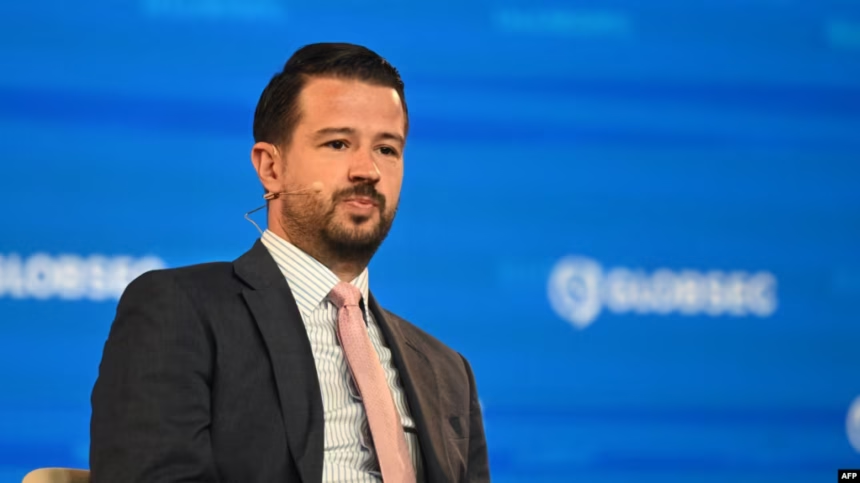Montenegro’s President Jakov Milatović has returned to the Parliament for re-examination one of the two agreements signed by the government of Montenegro with the United Arab Emirates – the one that would pave the way for the leasing of Long Beach in Ulcinj.
According to that agreement, Montenegro would lease the Long Beach for 99 years to the Emirati company Emmar, owned by businessman Mohamed Alabbar, who would build a mega-tourist complex in Ulcinj.
Alabbar has also been involved in regional projects in Croatia, Albania, and the “Belgrade on Water” project in Serbia.
However, Milatović, who ratified the Law on Economic Cooperation, did not do the same for the Law on Cooperation in Tourism and Real Estate Development, which he returned to the deputies for a re-vote.
For the agreements signed by Prime Minister Milojo Spajić at the end of March with UAE officials to take effect, the Montenegrin Parliament approved both laws through an expedited procedure on April 23, as proposed by the government.
These were supported by the parliamentary majority – Spajić’s movement “Europe Now”, the “New Serbian Democracy” party, the Democrats, and the Bosniak Party.
Before the approval, Milatović and part of the non-governmental sector warned that ratifying the Tourism and Real Estate Development Cooperation Agreement would suspend the Constitution and some of Montenegro’s laws.
Milatović’s return of the law forces the Parliament to re-vote on it. If the law is approved again, it will be sent back to Milatović for signing. According to the Constitution, in this case, he is required to sign it, and the law will come into effect.
Reasons for Milatović’s Return of the Agreement
According to Milatović’s office, the reasons for not signing are many unresolved issues in the agreement, for which the public has not received adequate answers from the government.
The main criticisms are that the agreement does not respect the principle of competition and equal standing in the market, suspends domestic legislation on public procurement, tenders, and state property, and lacks legal and financial analyses for many obligations taken on by the government.
The agreement, according to Milatović, represents practically a one-sided binding act, with numerous obligations for the state of Montenegro, while not containing any concrete obligations from the other party to protect the state’s interests in this legal relationship.
This approach, as claimed, places Montenegro in an unequal position in relation to the contracting party.
Milatović finally calls on the deputies, during the re-examination, to take into account all the objections to the agreement from certain state institutions, local communities, the non-governmental sector, and European officials, to prevent any harmful consequences to national interests.
For the reasons for returning the agreement, Milatović has informed the UAE Foreign Minister, Sheikh Abdullah bin Zayed Al Nahyan, by phone.
Is Ulcinj the Main Reason for the Agreement?
Although the agreement does not mention the location of investments, the government previously announced that it relates to Mohamed Alabar’s investments in Long Beach in Ulcinj, which has been strongly opposed by local authorities, the opposition, and environmentalists.
This concerns a 99-year concession for a part of Long Beach, about 20 million square meters, where tourist complexes and residential buildings would be built, as Prime Minister Spajić has repeatedly stated.
In early April, he stated in Parliament that Alabar is ready to invest around 35 billion euros. He later clarified this statement, saying that this refers to the potential for attracting such an investment.
The agreement obliges the government to prepare planning documentation according to the desires of the Emirati investors, build infrastructure for the projects, take on the costs of expropriation, etc.
It is unclear how much this will cost Montenegro.
The MANS Network (Montenegro’s NGO sector), which has fought corruption for decades, has warned of a high risk of money laundering, as the data on the real owners of companies registered in the Emirates is not publicly available.
The government will not be able to verify to whom it has given state property, say MANS representatives.
The non-governmental sector considers that the agreement is in conflict with European law in areas like procurement, competition, and environmental protection.
These issues are covered by chapters on capital circulation freedom, public procurement, competition, and environmental protection, which Montenegro aims to close with the European Commission by the end of the year.
Montenegro’s government aims to close all negotiating chapters by the end of 2026, so that two years later, Montenegro could become a member of the European Union.







